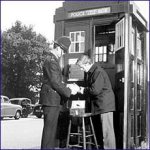Law Weblog
More on flagpoles. Comment: absolutely none
Monday 31 July 2006 at 7:29 pm | In News | Post CommentChurchill Insurance has been prosecuted after a flagpole fell from the ninth floor of its office in Bromley, south London, narrowly missing two women and injuring a man on the back of his legs. The fibreglass flagpole fell from a director’s balcony area and landed on the high street below. The entire incident was captured on a nearby CCTV.
Whole story here. 
Careers: apply to be a police officer at 16?
Friday 28 July 2006 at 9:52 pm | In News | Post Comment The law on age discrimination starts on 1 October 2006 (the Employment Equality (Age) Regulations 2006). Employers must not discriminate on age grounds in various work situations including recruitment. With the recruitment age for police officers being lowered to 18 and because it takes 18-24 months to process applications, the Association of Chief Police Officers (ACPO) has suggested that, to enable individuals to actually enter the police service at 18 years, they should consider accepting applications from 16 year olds.
The law on age discrimination starts on 1 October 2006 (the Employment Equality (Age) Regulations 2006). Employers must not discriminate on age grounds in various work situations including recruitment. With the recruitment age for police officers being lowered to 18 and because it takes 18-24 months to process applications, the Association of Chief Police Officers (ACPO) has suggested that, to enable individuals to actually enter the police service at 18 years, they should consider accepting applications from 16 year olds.
Flying the flag for the World Cup
Wednesday 26 July 2006 at 11:10 am | In News | Post CommentFlying a ‘national flag’ can get you into hot water.
Football supporters who drape national flags from their upstairs windows are in breach of the law.
It is unlawful to fly a ‘national flag’ unless it is on a vertical flagstaff.
So daft is the prospect of a local authority taking action against such a flagrant breach of the law that the government stepped in on 24 July to propose relaxing Statutory Instrument 1992 No. 666 The Town and Country Planning (Control of Advertisements) Regulations 1992.
Government consultation here.
Record number of Queen’s Counsel
Wednesday 19 July 2006 at 3:38 pm | In News | Post Comment175 lawyers have been appointed silk today, the first appointments for three years. An early peek at the list shows few surprises, most new QCs coming from among the bar’s most respected senior “juniors” (remember a junior is any barrister who is not yet a QC). The ladies have done well, 11 women confirmed, more to be announced. The Department for Constitutional Affairs will publish the full list later this week.
More choice for law students
Tuesday 18 July 2006 at 6:12 pm | In News | Post CommentThe College of Law has become the first non-university-affiliated law school to win degree-awarding powers.
From September 2006, students completing the college’s graduate diploma in law (GDL) – often taken by students who do not have a first degree in law – and the legal practice course (LPC) – the solicitors’ vocational stage – will graduate with a law degree (LLB) rather than a diploma. 
It also has the power to award students masters degrees in law (LLMs). The BPP Law School has also applied for degree-providing status, but is not likely to receive government approval until mid 2007. The Privy Council’s grants degree-awarding powers following a review by the Quality Assurance Agency (QAA) and a recommendation to the Department for Education and Skills.
Lord Levy’s arrest
Sunday 16 July 2006 at 2:01 pm | In News | Post CommentThe Lord Levy may be miffed at being arrested but his legal team will ask technical questions about the arrest. On January 1st this year police powers of arrest changed.
The use of powers of arrest must be fully justified and officers exercising the power should consider if the necessary objectives can be met by other, less intrusive means. The exercise of arrest powers is subject to a test of “necessity” based around the nature and circumstances of the offence and the interests of the criminal justice system. Arrest must never be used simply because it can be used; “theatrical” arrest – as was alleged in this case – is simply unlawful.
A lawful arrest requires two elements:
1. A person’s involvement or suspected involvement or attempted involvement in the commission of a criminal offence; AND
2. Reasonable a ground for believing that the person’s arrest is “necessary” and it is this “necessity principle” which may prompt legal inquiry into the arrest of the Lord Levy. (Sections 110 and 111 of the Serious Organised Crime and Police Act 2005).
Well then, what are the “necessary criteria”? There are probably 9, depending on how you count them.
(one) to enable the name (and address) of the person in question to be ascertained;
or to prevent the person in question-
(two) (i) causing physical injury to himself or any other person;
(three) (ii) suffering physical injury;
(four) (iii) causing loss of or damage to property;
(five) (iv) committing an offence against public decency; or
(six) (v) causing an unlawful obstruction of the highway;
(seven) (d) to protect a child or other vulnerable person from the person in question;
(eight) (e) to allow the prompt and effective investigation of the offence or of the conduct of the person in question;
(nine) (f) to prevent any prosecution for the offence from being hindered by the disappearance of the person in question.
Clearly most of these reasons do not apply, no doubt the reason will be made clear in due course, could it be number ‘eight’ Lord Levy doesn’t thinks so, surely in can’t be number ‘nine’; holding of breath is not recommended.
A Whopping Folly?
Sunday 16 July 2006 at 9:50 am | In News | Post Comment Burger King™ sell a fairly ordinary burger called a “Whopper”; I doubt there is a law student in the UK who doesn’t know that. However, I doubt that many UK law students know that there is a large oatmeal flapjack also called a “Whopper™ “. Confusion is not on the menu, yet Burger King has threatened legal action against the Welsh flapjack maker. A similar battle of David and Goliath has been arraigned between a small greengrocer in Bournemouth and the famous Covent Garden™ market, because the tiddler in Bournemouth has used the same name for his/ her local shop, which sells the same produce. The big boys will win.
Burger King™ sell a fairly ordinary burger called a “Whopper”; I doubt there is a law student in the UK who doesn’t know that. However, I doubt that many UK law students know that there is a large oatmeal flapjack also called a “Whopper™ “. Confusion is not on the menu, yet Burger King has threatened legal action against the Welsh flapjack maker. A similar battle of David and Goliath has been arraigned between a small greengrocer in Bournemouth and the famous Covent Garden™ market, because the tiddler in Bournemouth has used the same name for his/ her local shop, which sells the same produce. The big boys will win.
Carter Review: legal aid procurement
Thursday 13 July 2006 at 11:29 pm | In News | Post CommentLord Carter today published his report into legal aid procurement. It will take us some time to digest his rather large report. Simply, it proposes stripping around £100 million each year from the criminal legal aid budget.
Criminal justice – compare and contrast
Wednesday 12 July 2006 at 6:59 am | In News | Post Comment A story about a recycling bin that is of no particular consequence except that it appeared during the week that the Attorney General declared that the judge in the Sweeney paedophile case had correctly applied the law. It shows the range of behaviours that are “criminal”.
A story about a recycling bin that is of no particular consequence except that it appeared during the week that the Attorney General declared that the judge in the Sweeney paedophile case had correctly applied the law. It shows the range of behaviours that are “criminal”.
Sweeney kidnapped and indecently assaulted a 3 year old girl and was given a minimum custodial sentence of less than 6 years.
Exeter woman Donna Challice aged 30 wound up in court over the shocking state of her recycling bin which had been contaminated with all manner of inappropriate waste – from cigarette butts to potato peelings; however the prosecution failed to prove that the defendant herself had dumped it there. Anyone could have fouled Ms Challice’s bin, but it was not her. Donna had been warned about the state of her green bin, but it continued to become contaminated with non-recyclable waste, the council offered help to address the issue.
Donna’s case was the first of its kind and the £5,000 legal bill was paid for by Exeter council tax payers. Sweeney’s sentence will not be referred by the Attorney General to the Court of Appeal because it is not unduly lenient.
Grrrrrr, the “FCUK” Trade Mark is not invalid
Monday 10 July 2006 at 7:43 pm | In News | Post CommentThe Trade Mark “FCUK” can be registered by French Connection Limited.
It was claimed in an appeal to the Appointed Person that the controversial trade mark was “contrary to … accepted principles of morality” under Section 3(3)(a) of the Trade Marks Act 1994.
It was argued that the acronym caused offence not because it is seen as the swear word “f**k” because of wordplay, mistake or misconstruing of the letters, but because it essentially was the swear word. It was so obviously intended to be the swear word that everyone would interpret it as such and therefore was contrary to “accepted principles of morality”. This line of reasoning was rejected by the Appointed Person, Richard Arnold QC on 27 May 2006.
The mark will continue to offend a section of society but nevertheless French Connection Limited can continue to benefit from it (if people buy their offending products).
This case was distinguished from the “FOOK” case, where it was held that the word “FOOK” could be phonetically identical to the word “f**k” and therefore the application was rejected.
Powered by WordPress with Pool theme design by Borja Fernandez.
Entries and comments feeds.
Valid XHTML and CSS. ^Top^